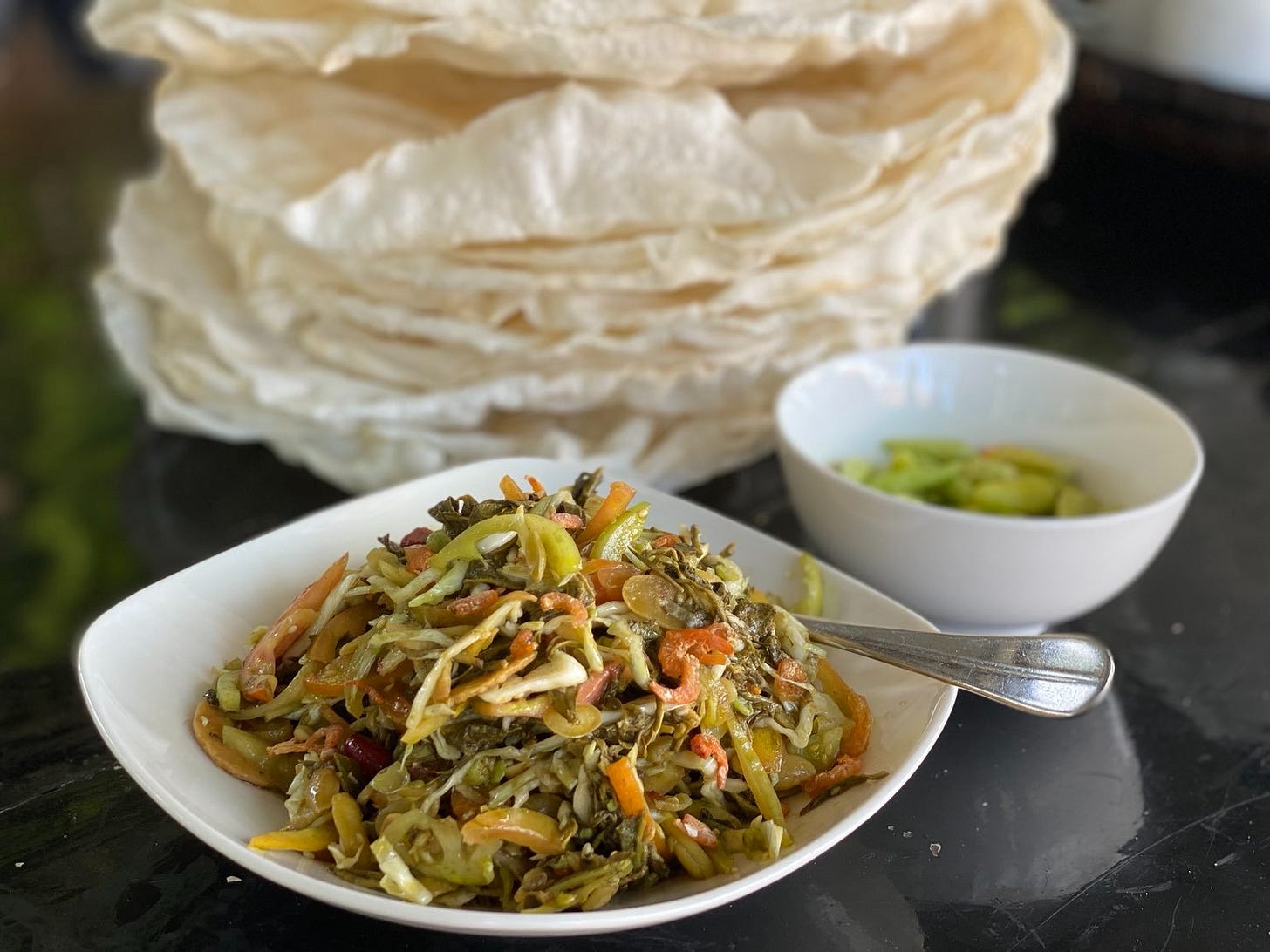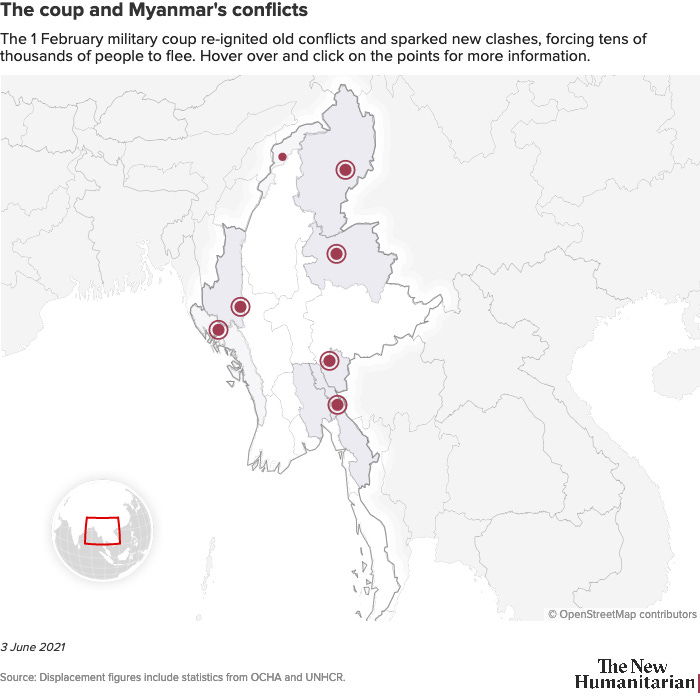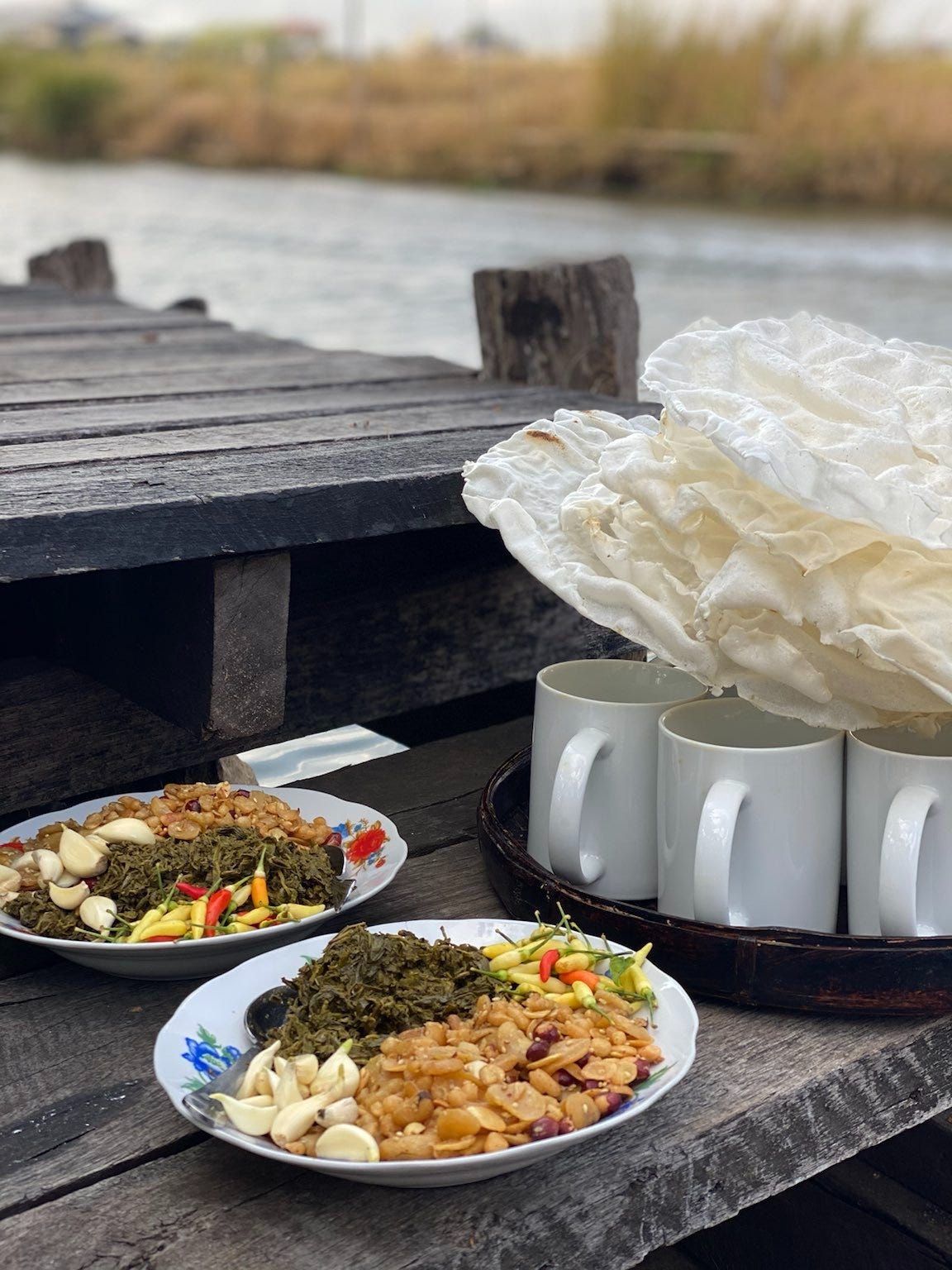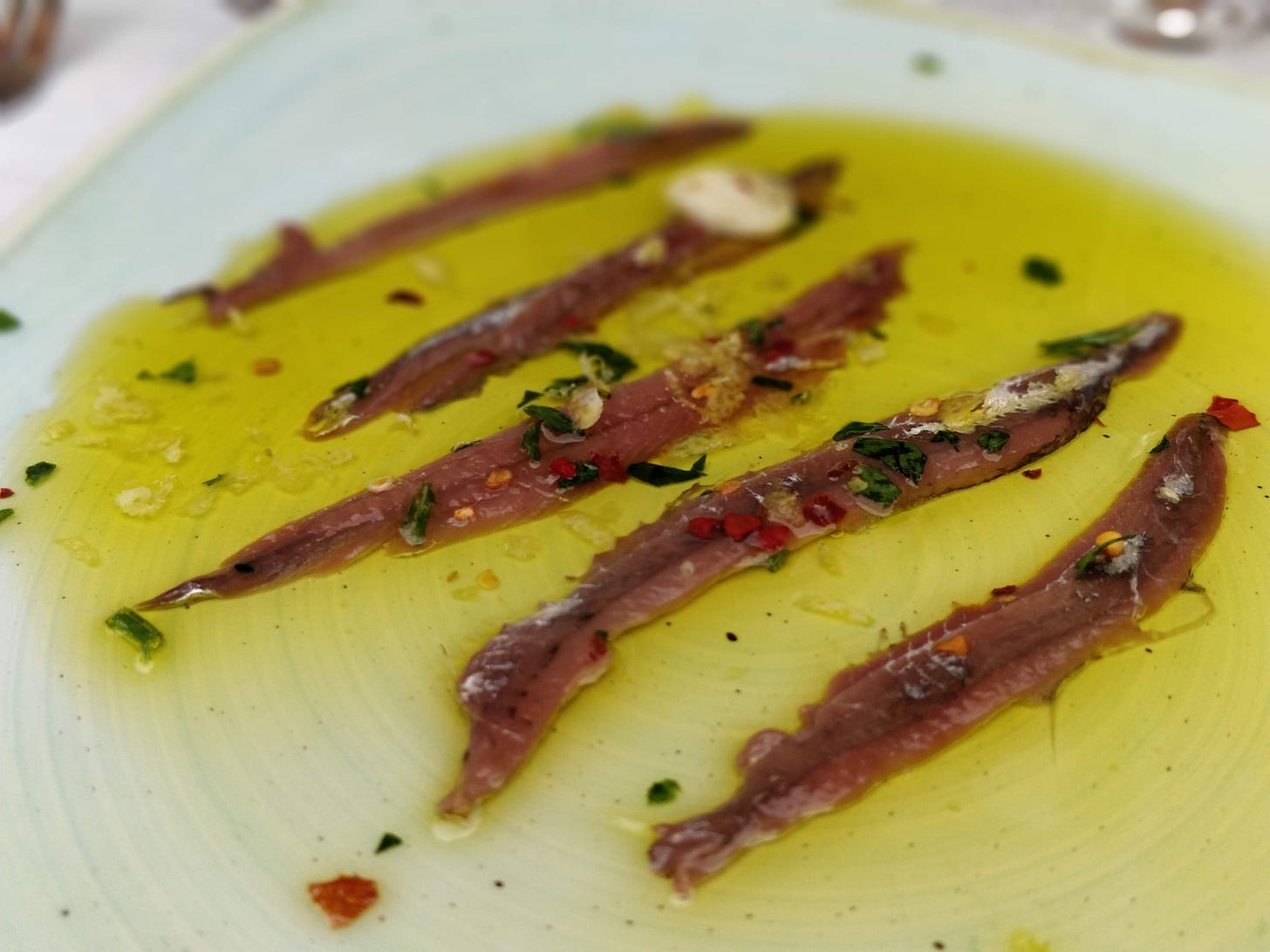Home is where the food (and hunger) is
A newsletter about food systems, climate change and everything connected to them
Back to the Golden Land… briefly
Have you ever had Burmese food? If so, I’m pretty certain you would have come across pickled tea leaf salad (laphet thote/လဖက်သုတ်) a quintessentially Burmese dish and the first one I learnt to “make” after I left home because there is practically no cooking involved.
The basic ingredients are pickled tea leaves and a mix of garlic and nuts that are fried to a crisp. The more elaborate versions include thinly sliced garlic, fresh chili, shredded cabbage and tomatoes. Some use dried whole shrimps, others prefer the powdered version.
However way you make it, it is an umami explosion in your mouth - the bittersweet taste of the oil-soaked leaves, the crunch of the nuts, the spicy-salty-sour hit from the seasoning, and the refreshing bites of fresh vegetables.
I’ve eaten many varieties of the salad over the years, whether sitting cross-legged on bamboo floors or upright in stiff wooden chairs, in towns and villages across Myanmar. I am immensely proud of its uniqueness to Myanmar cuisine and always ready to tuck in whenever a plate is placed in front of me.
Imagine my devastation when I discovered I could no longer make my beloved laphet thote in the way I’d been making all my life. It felt like a metaphor for what’s going on back home.
So I wrote a paean to the salad and the delicious street food in Myanmar for Nikkei Asia.
The day after, I re-visited the same topics - the intersection of food and politics - but from a very different angle, for The New Humanitarian.
Residents, aid workers and political leaders in Myanmar’s border areas warned a hunger crisis is looming in these regions, precipitated by the Feb 1 coup.
I’d written before about how Myanmar’s economy was already wrecked by COVID-19-related lockdowns. Well, the coup has worsened the business climate and led to a cash crunch. Meanwhile, a rise in armed conflicts has resulted in a new wave of displacement. All of this has pushed up the prices of key commodities.
As if this isn’t bad enough, guess what? Monsoon season is just around the corner and the infrastructure in many of these remote, conflict-affected areas, which already suffer from higher-than-national-average hunger levels, is really poor and roads are often impassable after downpours.
There is an urgent need for humanitarian assistance and I hope it can reach affected people before it is too late.
If you are interested to find out more about what’s happening in Myanmar, U.S.-based literary journal Adi Magazine is publishing a whole issue on this topic, with short stories, poems and much more. I spoke to them at length - 25 minutes read, so no I’m not exaggerating - about many thanks, including why we may finally have a chance at nation-building.
Receipts on alternative food production
This Twitter thread is great if you’re curious about transforming our food systems to become more sustainable but not sure if the methods touted as environmentally-friendly could actually feed a growing global population.
Philip linked to a whole host of studies and papers published in well-respected journals that show how systems like agroecology and organic production, whether it’s for meat, wine, or fruits, can be both ecologically and economically sustainable.
Caveat - I haven’t read all the papers mentioned in the thread but I’m trusting Philip on this.
#GenerationRestoration
The United Nations urged world leaders in a new report to restore at least 1 billion hectares of degraded land - an area about the size of China - in the coming decade to face off the triple threat of climate change, loss of nature and pollution.
“We are using the equivalent of 1.6 Earths to maintain our current way of life,” said the report, published to coincide with the beginning of the UN Decade on Ecosystem Restoration 2021-2030.
“That means conservation efforts alone are insufficient to prevent large-scale ecosystem collapse and biodiversity loss,” they said in a press release.
Degradation is already affecting the well-being of an estimated 3.2 billion people - 40% of the world’s population - but things like agroforestry (planting trees on cropland) has the potential to increase food security for 1.3 billion people.
If you don’t want to read the full report, here’s an article from the Thomson Reuters Foundation on the report. There’s also a handy guide from WRI on why it is important to restore ecosystems.
The report was launched ahead of World Environment Day on Jun 5. And if you’re counting, there’s also World Food Safety Day (Jun 7) and World Ocean Day (Jun 8) coming up.
Sending the right message
Marion Nestle, the food guru (and not related to that conglomerate), featured this Rockefeller Foundation’s guide on how to frame food system issues in her Food Politics blog and I had to check it out.
The foundation said they came up with Reset the Table: Messaging Guide because, “One of the consistent needs we’ve heard expressed by those seeking to transform the food system is a shared narrative to motivate and sustain the needed changes in the system.”
It provides examples of how to frame food system issues, whether it’s about school meals or racial justice, and later in the report, there’s more information about the research on which the guide is based.
Glaring inequalities
Inequality afflicts the world in many ways, from access to vaccines to green spaces, from greater mobility to more opportunities, but since I focus on food and climate issues, I’m sharing some of the interesting articles and stories I’ve come across in the past week in this space.
Bloomberg has this fascinating article about Black climate scientists who are working to make the industry more diverse.
According to one of the scientists interviewed, “Geosciences, which includes climatology, is home to the least diverse population of PhD candidates among the science, technology, engineering and mathematics disciplines”.
And why does this matter?
“When scientists overlook communities in nations either rich and poor—when they don't monitor air and water continuously and don't watch storm patterns—they can't help save lives and boost livelihoods. In this way, racism also generates an incomplete picture of the world that can limit policymaking, leaving many millions of people facing disproportionate harm from growing threats.”
If you haven’t read too many articles on the Bloomberg site you might be able to read this one for free, and if you have, perhaps you should subscribe. Journalists have to eat too.
Staying in North America, I got a press release this week from Food Rescue Hero, a food recovery platform, saying they’ve launched a home delivery function to people in need in the U.S. and Cananda, because “One in five Americans reported not always knowing where their next meal would come from”.
We’ve all seen pictures and videos of miles-long queues at food banks and distribution centers, but that probably leaves out a fair chunk - 35% of people who live below the poverty line do not have access to cars, they said, citing data from the USDA.
Let’s hop to the tiny Pacific island nation of Palau, for this interesting but also very sad story in Hakai Magazine about how women, who traditionally collected and sold sea cucumbers, were forced out of the trade in 2011 by men when prices of the dried echinoderms reached eye-watering levels among Chinese consumers.
Within a year, the men plumbed this precious resource to such a degree the population fell by 88% and is still hasn’t recovered.
“With the party over, men who profited from the trade returned to their fishing businesses, and women gleaners were left to bear the loss of their cultural practice and livelihood.”
Thanks to Numlock News for the recommending the story.
Meanwhile, Greenpeace Africa charged in its latest report that every year, European farmed animals consume enough wild fish that could be fed to 33 million West Africans.
More than half a million tonnes of small pelagic fish are extracted every year along the coast of West Africa to be converted into feed for aqua and agriculture farming, dietary supplements, cosmetics and pet food products outside Africa, the report said.
It also identified major retailers across Europe who have been linked to the fish meal and fish oil trade from West Africa. They include E.Leclerc and Carrefour in France, Edeka in Germany, Mercadona in Spain and Tesco and Sainsbury’s in the UK. Go to Page 8 in the report for the full list.
The practice is “undermining food security in coastal communities of Mauritania, Senegal and The Gambia, particularly in Mauritania where 70% of the fish oil exports went to the EU in 2019”, according to Greenpeace Africa.
Let’s end on an uplifting note, though. For this, head to the Global Alliance for the Future of Food’s Beacons of Hope: Stories of Food Systems Transformation During COVID-19 which features 7 that responded to the COVID-19 pandemic with “creativity, adaptability and resilience”.
They include Gastromotiva in Brazil which launched a network of Solidarity Kitchens where its students and alumni cooked in their homes and provided meals to vulnerable people to the Lagos Food Bank Initiative in Nigeria which went beyond the traditional food bank model to address the root causes of hunger.
As always, have a great weekend! Please feel free to share this post and send tips and thoughts on twitter @thinink, to my LinkedIn page or via e-mail thin@thin-ink.net.










